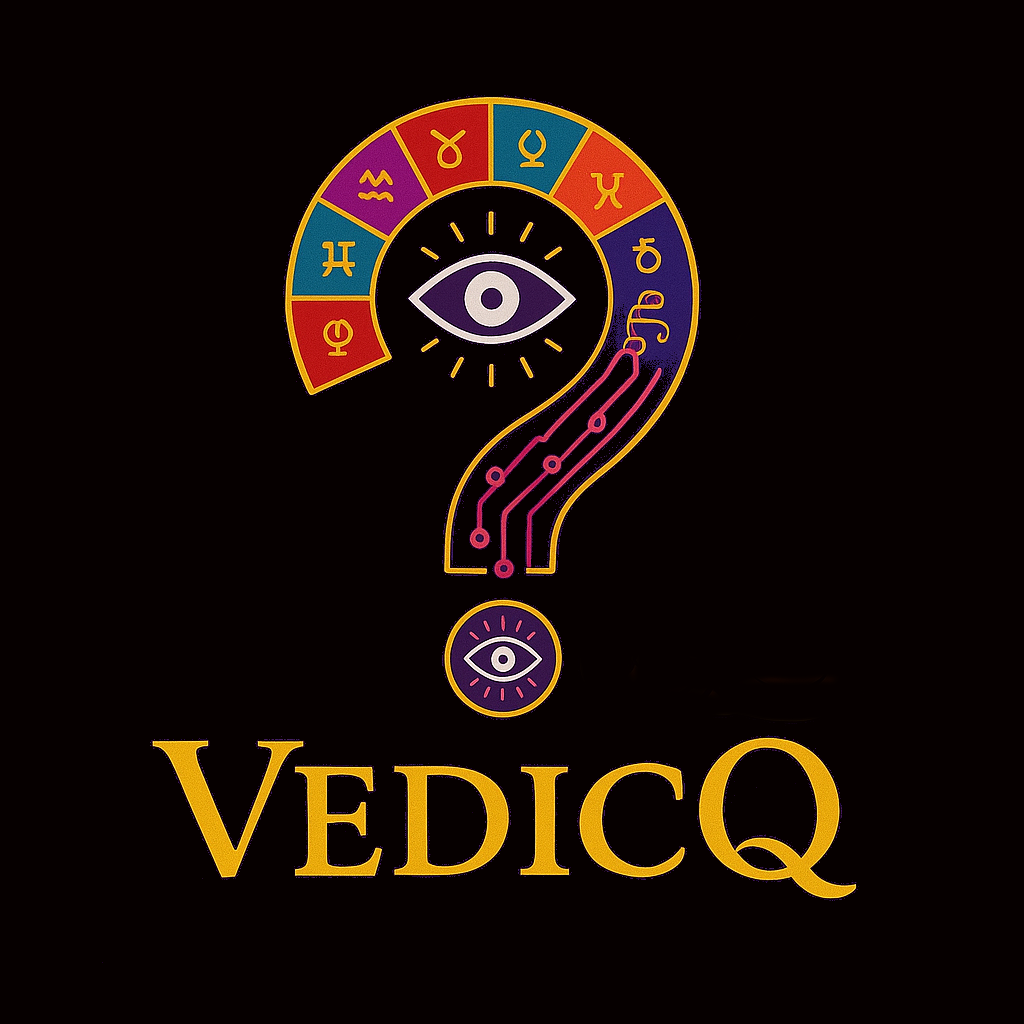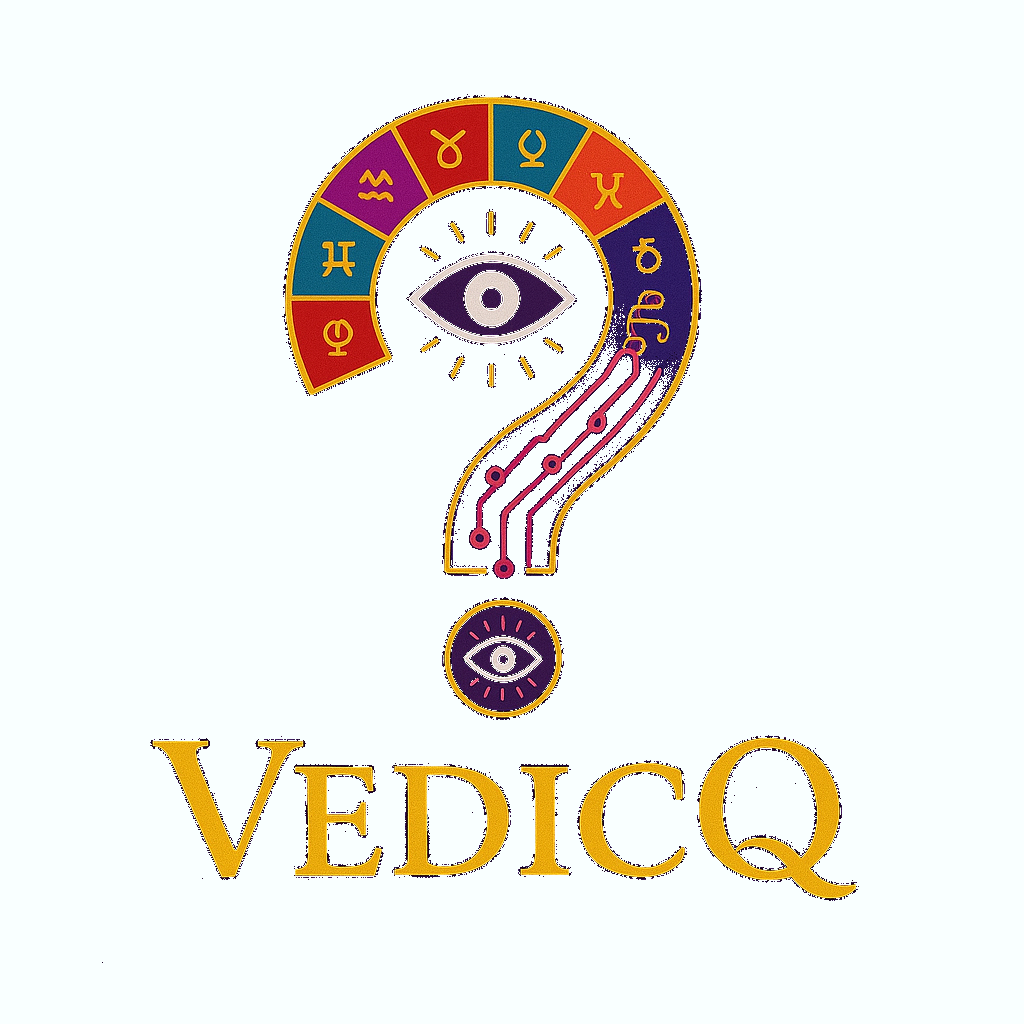· VedicQ · Tutorials · 7 min read
Vedic Astrology- Artificial Intelligence vs. Traditional Astrology
Discover how AI is transforming Vedic astrology with unmatched accuracy, speed, and integrity—especially in a world full of misleading human astrologers.

Introduction
Vedic astrology, also known as Jyotish Shastra, is an ancient system of astrology rooted in the Vedas, the sacred scriptures of India. It provides insights into a person’s character, destiny, and future by analyzing the positions of planets and stars at the time of birth. Traditionally, this sacred knowledge has been interpreted by learned astrologers who undergo years of study and spiritual discipline. However, with the advent of Artificial Intelligence (AI), the field of Vedic astrology is experiencing a transformative shift. AI algorithms now attempt to interpret astrological charts with speed, accuracy, and accessibility never seen before. This blog delves deep into the juxtaposition of AI-driven astrology and traditional practices, exploring the advantages of AI, challenges in human astrology today, and the benefits of a hybrid model.
The Foundation of Vedic Astrology
Vedic astrology is based on the sidereal zodiac system, unlike the Western tropical zodiac. It uses astronomical calculations and detailed birth information, such as date, time, and place, to create a Kundli or natal chart. This chart maps the positions of celestial bodies in twelve houses, each representing different aspects of life like health, wealth, relationships, and career.
Traditional Vedic astrology interprets this chart using principles outlined in ancient texts such as the Brihat Parashara Hora Shastra, Jataka Parijata, and Phaladeepika. These texts provide guidelines on planetary combinations (Yogas), transits (Gochara), and Dasha systems (Vimshottari Dasha) to forecast events in a person’s life. Understanding these patterns requires not only technical knowledge but also experiential wisdom and intuitive judgment developed over years of practice.
AI in Vedic Astrology: The Modern Revolution
AI in astrology involves machine learning algorithms, natural language processing, and data analytics. By feeding thousands of historical birth charts and outcomes into an AI system, the machine learns patterns and correlations. AI can process vast datasets at lightning speed, providing instant interpretations and predictions.
This integration of technology is changing how astrological services are delivered. AI-powered apps and platforms offer users an opportunity to access astrological guidance without waiting for appointments or incurring high costs. The modern revolution in Vedic astrology is not about replacing traditional practices but enhancing and evolving them for the digital age.
How AI-Based Astrology Works
- Data Collection: AI tools gather massive datasets of birth charts, predictions, and actual outcomes. This includes planetary positions, house configurations, Dasha timings, and life events. Additionally, the AI is trained on the content of ancient Vedic texts and scriptures—such as those authored by Rishis like Parashara, Jaimini, and Varahamihira—spanning thousands of sutras and shlokas. Unlike any individual human who would require decades to even attempt this depth of study, AI systems can process, cross-reference, and apply this knowledge instantly and consistently.
- Pattern Recognition: Using machine learning, AI identifies patterns in astrological configurations and life events. These patterns help the AI predict future events and interpret chart meanings.
- Predictive Modeling: AI systems build predictive models that can generate interpretations based on inputted birth details. These models improve over time as more data is fed into the system.
- Natural Language Output: AI uses NLP to translate complex astrological data into readable and understandable language. This ensures that the user can easily comprehend the astrological insights generated.
Benefits of AI in Vedic Astrology
1. Speed and Accessibility
AI offers instant chart generation and interpretations, making astrology accessible to anyone with a smartphone or computer. Users no longer need to wait for appointments or consultations, thus saving time and effort.
2. Scalability
AI can handle millions of charts simultaneously, a feat impossible for any human astrologer. This enables mass-level astrological services for platforms and communities worldwide.
3. Data-Driven Accuracy
With access to massive datasets, AI can identify patterns that may elude even seasoned astrologers. This data-driven approach enhances the reliability of predictions and pattern analysis.
4. Objectivity
AI lacks emotional bias, ensuring impartial analysis. It offers standardized interpretations based on consistent logic and rule-based systems.
5. Cost-Effective
Many AI-based astrology apps offer free or low-cost services. This democratizes access, allowing people from all economic backgrounds to benefit.
6. Accurate Calculations
AI performs complex astronomical and astrological calculations with extreme precision. This reduces the chances of manual error and enhances confidence in the results.
7. Quick Comparative Analysis
AI can instantly compare hundreds of charts, trends, and configurations. This ability allows users to explore compatibility, career timing, or life event patterns across many data points.
8. Comprehensive Knowledge Integration
AI can be programmed with all classical and contemporary astrological texts. This means users benefit from the cumulative wisdom of thousands of years of astrological tradition.
9. Consistency
AI delivers consistent interpretations based on standardized rules. Unlike human astrologers who may differ in opinion, AI provides uniform insights for the same chart data.
10. 24/7 Availability
AI systems are always available, offering round-the-clock astrological guidance regardless of time zones. This ensures immediate access to insights anytime, anywhere.
Challenges with Human Astrologers in the Modern Market
While traditional astrologers offer valuable human insights, the current market is flooded with self-proclaimed experts who lack genuine knowledge and training. Many are driven by commercial interests rather than a sincere understanding of Jyotish Shastra.
There are increasing reports of astrologers offering vague or generalized advice, upselling expensive remedies, and manipulating client fears to extract money. This has made it difficult for genuine seekers to distinguish between knowledgeable practitioners and opportunistic frauds.
Finding a trustworthy and learned astrologer today is a challenge. This makes AI-based astrology an appealing alternative—free from greed, ego, and inconsistency. Users can rely on technology to provide unbiased and transparent insights.
The Hybrid Approach: Best of Both Worlds
Some platforms and practitioners are now combining AI with traditional astrology. AI handles the preliminary chart generation and basic analysis, while human astrologers provide contextual insights and spiritual remedies. This synergy enhances both accuracy and depth, making astrology more accessible without losing its soul.
This approach also helps clients get the best of both worlds: the efficiency and reach of AI with the depth and intuition of human advisors. It allows for better decision-making and more holistic understanding.
Case Study: Hybrid Astrology at VedicQ.com
VedicQ.com exemplifies the hybrid model, leveraging advanced AI for high-precision calculations and predictive analytics. Their system is trained on ancient texts and traditional frameworks, making it both intelligent and spiritually aligned.
What sets VedicQ apart is its commitment to accuracy and transparency. The AI is used not just to automate, but to elevate the quality of predictions—ensuring consistency, eliminating fraud, and guiding users toward truth rather than fear-driven remedies.
Conclusion: The Future is AI-Assisted Vedic Astrology
As we move into an increasingly digital world, the sacred wisdom of Vedic astrology can evolve with it, maintaining its spiritual roots while embracing technological advancements. AI is rapidly becoming the backbone of modern astrology due to its speed, precision, and ability to access and integrate vast astrological knowledge.
Traditional astrologers will always have a role, especially in offering spiritual guidance. But for those seeking quick, accurate, and honest astrological insights, AI is becoming the more trusted companion.
Platforms like VedicQ.com showcase how AI can be wielded to cut through misinformation and provide meaningful, authentic astrology rooted in tradition but empowered by technology. In the constellation of the future, AI will be the guiding star of Jyotish.
Final Thoughts
AI is not a replacement but a transformative tool—one that can democratize access to astrological insights, protect users from fraud, and restore faith in this ancient science. In an era where finding a genuine astrologer has become a challenge, AI stands as a guardian of truth and efficiency.
For seekers of cosmic wisdom, the message is clear: Trust in the timeless wisdom of Vedic astrology, but let the precision of AI guide your way.






